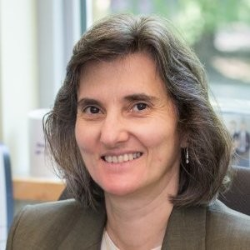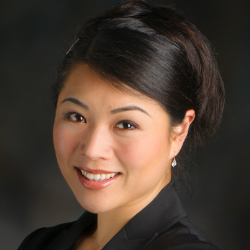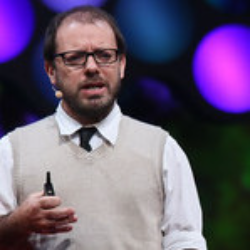With the successful and growing use of digital twin approaches in established industries such as power, propulsion, and aerospace combined with a rapidly developing biomedical ecosystem of computing, modeling, and expanding data has opened the door to develop the role of digital twins in biomedical applications. The workshop will bring together leaders in the use of digital twins and biomedical applications to provide key insights into launching digital twin efforts, factors influencing the present environment, challenges and opportunities expected along the way, and broader questions shaping the future for digital twins in biomedical applications.
Anastasia Christianson, PhD, Pharma Industry Data Science Leader
Caroline Chung, MD, MSc, FRCPC, CIP, Vice President, Chief Data Officer, Director of Data Science Development & Implementation, Institute for Data Science in Oncology, MD Anderson Cancer Center
Dan Isaacs, CTO, Digital Twin Consortium
Eric Stahlberg, PhD, Director, Cancer Data Science Initiatives, Cancer Research Technology Program, Frederick National Laboratory for Cancer Research, Rockville, Maryland, USA
Mariano Vazquez, PhD, Co-Founder and CTO, ELEM Biotech, Barcelona, Spain
INSTRUCTOR BIOGRAPHIES:
 Anastasia Christianson, PhD, Pharma Industry Data Science Leader
Anastasia Christianson, PhD, Pharma Industry Data Science Leader
Strategic, visionary leader with an established track record of building and leading multidisciplinary, global Informatics and IS/IT teams, driving change and simplification and delivering value through innovation. Over 20 years’ experience in the biotechnology and pharmaceutical industry working in both Discovery and Development leading projects, managing complex portfolios, driving change programs, identifying opportunities for strategic initiatives, and translating scientific and medical questions into innovative solutions. Areas of particular strength include: strategy development and implementation, translational medicine, biomedical and health informatics, evidence-based decision makings, data and decision science, and "Big Data" exploitation.
 Caroline Chung, MD, MSc, FRCPC, CIP, Vice President, Chief Data Officer, Director of Data Science Development & Implementation, Institute for Data Science in Oncology, MD Anderson Cancer Center
Caroline Chung, MD, MSc, FRCPC, CIP, Vice President, Chief Data Officer, Director of Data Science Development & Implementation, Institute for Data Science in Oncology, MD Anderson Cancer Center
Dr. Chung is Vice President and Chief Data Office and Director of Data Science Development and Implementation of the Institute for Data Science in Oncology at MD Anderson Cancer Center. She is a clinician-scientist, and associate professor in Radiation Oncology and Diagnostic Imaging with a clinical practice focused on CNS malignancies and a computational imaging lab focused on quantitative imaging and modeling to detect and characterize tumors and toxicities of treatment to enable personalized cancer treatment. Motivated by challenges observed in her own clinical and research pursuits, Dr. Chung has developed and leads institutional efforts to enable quantitative measurements for clinically impactful utilization and interpretation of data through a collaborative team science approach, including the Tumor Measurement Initiative (TMI) at MD Anderson. Internationally, Dr. Chung leads several multidisciplinary efforts to improve the generation and utilization of high-quality, quantitative data to drive research and impact clinical practice, including her role as Vice Chair of the Radiological Society of North America (RSNA) Quantitative Imaging Biomarker Alliance (QIBA), Co-Chair of the Quantitative Imaging for Assessment of Response in Oncology Committee of the International Commission on Radiation Units and Measurements (ICRU) and National Academies of Sciences, Engineering, and Medicine (NASEM)-appointed committee addressing Foundational Research Gaps and Future Directions for Digital Twins. Beyond her clinical, research, and administrative roles, Dr. Chung enjoys serving as an active educator and mentor with a passion to support the growth of diversity, equity, and inclusion in STEM, including her role as Chair of Women in Cancer ( http://www.womenincancer.org/ ), a not-for-profit organization that is committed to advancing cancer care by encouraging the growth, leadership, and connectivity of current and future oncologists, trainees and medical researchers.
 Dan Isaacs, CTO, Digital Twin Consortium
Dan Isaacs, CTO, Digital Twin Consortium
Dan Isaacs is Chief Technology Officer of Digital Twin Consortium, where he is responsible for setting the technical direction for the Member Consortium, liaison partnerships and business development support for new memberships. Previously, Dan was Director of Strategic Marketing and Business Development at Xilinx where he was responsible for emerging technologies including AI/Machine Learning, including defining and executing the ecosystem strategy for the Industrial IoT. Prior to joining the Digital Twin Consortium, Dan was responsible for Automotive Business Development focused on Automated Driving and ADAS systems. Dan represented Xilinx to the Industrial Internet Consortium (IIC). He has more than 25 years of experience working in automotive, Mil/Aerospace and consumer-based companies including Ford, NEC, LSI Logic and Hughes Aircraft. An accomplished speaker, Dan has delivered keynotes, presentations and served as panelist and moderator for IIC World Forums, Industrial IOT Global conferences, Embedded World, Embedded Systems, and FPGA Conferences. He is a member of international advisory boards and holds degrees in Computer Engineering: EE from Cal State University, B.S. Geophysics from ASU.
 Eric Stahlberg, PhD, Director, Cancer Data Science Initiatives, Cancer Research Technology Program, Frederick National Laboratory for Cancer Research, Rockville, Maryland, USA
Eric Stahlberg, PhD, Director, Cancer Data Science Initiatives, Cancer Research Technology Program, Frederick National Laboratory for Cancer Research, Rockville, Maryland, USA
Dr. Eric Stahlberg now directs cancer data science initiatives at the Frederick National Laboratory, having led and launched several initiatives at the lab. He has been instrumental in establishing the Frederick National Laboratory’s high-performance computing initiative and in assembling scientific teams across multiple, complex organizations to advance predictive oncology. Stahlberg first joined the Frederick National Laboratory in 2011 to form and direct the National Cancer Institute’s Center for Cancer Research Bioinformatics Core, which helped build intramural research collaborations between the national laboratory and the National Cancer Institute. Since then, Stahlberg has played a leadership role in many key partnerships, including a major collaboration between the National Cancer Institute and the Department of Energy. Under the Joint Design of Advanced Computing Solutions for Cancer (JDACS4C), the National Cancer Institute and Department of Energy are accelerating progress in precision oncology and computing. The collaboration is rooted in three major national initiatives; the Precision Medicine Initiative, the National Strategic Computing Initiative, and the Cancer Moonshot. He has helped lead initiatives to transform data management approaches at the lab as well as more recently leading program efforts exploring the application biomedical digital twins for cancer applications. Stahlberg has spearheaded the Frederick National Laboratory’s contributions to a number of JDACS4C projects, including ATOM and CANDLE. He helped launch the annual meeting series, Frontiers in Predictive Oncology and Computing, and co-organizes the annual Computational Approaches for Cancer and HPC Applications of Precision Medicine workshops. In 2017, he was recognized as one of FCW‘s Federal 100. Stahlberg holds a Ph.D. in computational chemistry from The Ohio State University.
 Mariano Vazquez, PhD, Co-Founder and CTO, ELEM Biotech, Barcelona, Spain
Mariano Vazquez, PhD, Co-Founder and CTO, ELEM Biotech, Barcelona, Spain
Mariano Vázquez, Ph.D. MV is co-founder and CTO / CSO of ELEM Biotech and researcher at the Barcelona Supercomputing Center (BSC). ELEM, a spinoff company of the BSC, was born to speeding up the technology transfer from BSC to the biomedical sector, by creating a supercomputer-based and cloud-deployed platform to perform in-silico clinical trials on massive populations of Virtual Humans. Virtual Humans are "avatars", a combination of sophisticate mathematical and computational modelling, and data, designed to predict the outcome of different therapies. Powered by BSC, our team develops tools which allows to study the cardiovascular and respiratory systems, with customers in both the medical devices sector and pharmaceutical industry. Infarction, ageing, damaged cardiac valves, arrhythmias, stent design or respiratory drug delivery are among the topics where such a tool can become a decisive help.